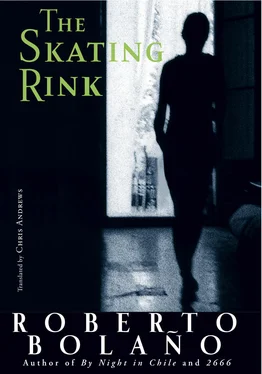Remo Morán:
The policemen were young and they didn’t look too smart
The policemen were young and they didn’t look too smart, although on the way there one of them said he had a degree in economics. The other one was an amateur mechanic, crazy about motorbikes; whenever he could get away, he went racing at the various meets in Catalonia and Valencia. Both were married and had kids. They weren’t so chatty when they got to Lola’s office, although after listening to my story and scribbling a bit in a none-too-clean notebook, they looked at each other as if thinking, This could be our big day. They decided to set off immediately for the Palacio Benvingut. A little apprehensively, they asked me to accompany them. Lola didn’t want me to go on my own (I don’t know what she thought might happen) and insisted on joining the group; after all, she was the only one who would be able to identify the body. When Lola had located the victim’s record card in a bulging file, the four of us left for the crime scene in the patrol car, an arrangement that I was to regret later on, because it meant I had to go back to Lola’s office to get my car, and by then I didn’t have much time or energy to spare. Nothing had changed at the Palacio Benvingut, except that the general impression of desolation, the atmosphere of premature autumn enveloping the house and its surroundings, had perhaps intensified. The body was still there, but the spilt blood didn’t seem as sinister, nor as red. Lola took a couple of steps on the ice and identified the victim without difficulty: Carmen González Medrano, vagrant. Later on, the police chief turned up to congratulate his officers, along with a kind of coroner, followed by three guys from the Red Cross and then a young woman of about thirty who identified herself as the local judge. She and Lola knew each other. They wrangled over the beggar’s record card. The judge wanted to keep it, but Lola flatly refused. Watching the two of them argue, both so young and energetic, I thought, This is the new Spain, striding boldly toward the future. By contrast, the old woman and I, nostalgic or passive or maybe just patient, were like two arrows flying back into the past, one quickly, the other in very slow motion. Finally, thanks to the coroner’s mediation, the women reached an agreement: Lola would keep the card and send a photocopy to the judge. As for me, I had to repeat my story a couple of times, and when we were allowed to go there was no one left to give us a lift. We walked back to Z. Lola looked slightly pale but very pretty. At first she told me what little she knew about the dead woman, but we ended up talking about her recent trip to Greece and what our son had got up to. In the afternoon, after various fruitless attempts to get in touch with Nuria, I decided to go to her apartment again and find out where she was. Her mother opened the door but didn’t invite me in. Her eyes were red and she was clearly in no mood for conversation. Nuria had gone to Barcelona. She didn’t know when she’d be back. At the hotel, Alex was waiting for me with a bombshell: the police had arrested Enric Rosquelles on suspicion of murder. I was obliged to repeat the story I had already told hundreds of times that morning; then I went up to my room to think. But instead I fell asleep, sitting on the sofa, and dreamed that bird-women, gathering in a flock outside, near the balcony, were looking at me through the windows, their wings beating quietly in the warm humid air. One by one I began to recognize them: Lola and Nuria, and other women from Z, although their faces were blurry so I couldn’t be sure. The old woman was fluttering in the middle, like a queen surrounded by her entourage. She was the only one really watching me. A gust blew the windows open and I felt her voice, just as the group of bird-women began to rise and clouds came down over the town. Even so, the dead woman’s voice made the windowpanes shake. She was singing. The words of her song were simple and repetitive: Avenge me, avenge me, avenge me — dear colleague, avenge me, avenge me, avenge me. Just before I woke up, I heard myself promising that I would, but first I had to find her killer. That night, after taking a shower, I went out for a walk and headed for Stella Maris. Gasparín, El Carajillo and a camper in a T-shirt were sitting outside the office, enjoying the cool of the evening. I stopped to chat for a while. Then I told Gasparín and El Carajillo to follow me. When we were alone on a path in the campground, I asked Gasparín where the girl was. Sleeping, he said, in my tent. Do you know where we found her? I asked El Carajillo. I can guess, he said. Well forget it, or keep it quiet until things are sorted out. That’s fine by me, said El Carajillo, but there might be a problem when the police get hold of her. They won’t, I said, and if they do, she’ll leave us out of it. We can trust her, can’t we? Gasparín didn’t reply. I repeated the question. It depends, said Gasparín, some people can, others can’t. Can I, for example? Yes, said Gasparín, I think so. El Carajillo too. And what about you? I don’t know, said Gasparín, what I’m trying to work out is whether she can trust me. We agreed that it would be best if both he and the girl kept a low profile. The police could find you through her, though the way things are going I don’t think they will. Gasparín was an illegal immigrant in Spain and as for his girlfriend, God only knew. When we went back to reception, the guy in the T-shirt was still there, and he started asking all sorts of questions about what had happened at the Palacio Benvingut. He told me it had been on the TV3 news, and it sounded like the scandal was just beginning. .
Gaspar Heredia:
Caridad adapted pretty well to life at the campground
Caridad adapted pretty well to life at the campground, although it was hard to tell at the start, because she rarely spoke, and I rarely asked her a question. Rather than really sharing the tent, we took turns in it: when I was getting ready for bed, she was waking up, and by the time I got up, she had already gone to sleep. We only had one meal together, the morning meal — dinner for me, breakfast for her — consisting of cheese, yogurt, fruit, boiled ham, and whole wheat bread, a diet designed to put some color back into her cheeks, although she remained reluctant to eat. If by chance we happened to be in the campground bar at the same time, we’d usually have a beer together. We didn’t talk much, but I soon discovered that she had the most disturbing voice I have ever heard. It was intensely pleasurable to crawl into the tent and find her smell clinging to the mess of clothes. It was even better to wake up and find her a few steps away from the tent, sitting on the ground, reading by the light of a gas lamp. The singer had told me about her ill health, but the only sign of it I could see was frequent bleeding from the nose, which according to Caridad was caused by the sun, no big deal. The worst thing was that sometimes she didn’t notice until the blood started dripping from her chin, and, if you didn’t know about her condition, it was a disquieting sight. When she got a nosebleed, every two days or so, she’d hold a damp handkerchief against her nasal septum, and lie on the ground face up beside the tent, waiting for it to stop. I exploited those opportunities to talk with her as tactfully as I could. I would start with the weather and end with her health. Naturally, whenever I suggested we go see a doctor, she flatly refused. Caridad, as I later found out, hated hospitals as much as she hated schools, police stations and old people’s homes. I never saw her bleed from the mouth or spit blood, which led me to suspect that Carmen had been mistaken or maybe, encouraged by my obvious interest, had exaggerated her friend’s ills. I never found out whether Caridad had parents, brothers, sisters or any other relatives. She kept her past sealed in the strictest silence, which was surprising for someone who hadn’t even reached the age of twenty. One day she ran into the boy with the motorbike in the campground bar. I saw them before I got there, and rather than going up to them or walking away, I watched from a distance. They spoke — the boy did, anyway, while Caridad moved her lips from time to time — for about ten minutes. Two charged-up batteries, I thought. Then they went their separate ways, like spaceships on diverging trajectories, and the vibrant emptiness they left in the bar threatened to swallow up the other clients. Another day, while we were having a beer, the boy appeared and started talking. He was speaking Spanish but using words that it seemed only he and Caridad could understand. Before leaving he smiled at me in a way that could have meant anything. The next time I saw him was at reception; he rode up on his bike, and said he wanted to talk to me. It turned out he only wanted to thank me for what I had done for Caridad. She’s out of her tree, he said, but she’s a good person. It was nighttime and the motorbike was making quite a racket. I told him to switch off the motor and push it to his tent, which he did. For many days, Caridad and I didn’t leave the campground except to buy provisions. We didn’t plan it that way; it was just that for different reasons neither of us felt like going out. I could have gone on like that forever, but the boy with the motorbike took to visiting every afternoon, coming straight to our tent without any kind of pretext. Still half asleep, I’d hear him arrive and start up a conversation with Caridad, who by that time, unless she’d gone to the bar, would be sitting outside the tent, with a book, but not reading, just thinking. One afternoon the boy came with his motorbike, and after talking in hushed voices for a couple of minutes, the pair of them disappeared. I thought I wouldn’t see her again. When they came back, at three or four in the morning, I was sitting beside the entrance barrier, and Caridad greeted me with a nod. Two days later the boy left the campground and Caridad stayed with me. At the time, El Carajillo told me, the town was in turmoil, on edge. The embezzlement was bigger news than the crime at the Palacio Benvingut, but I had no idea what was going on: I wasn’t buying newspapers or listening to the radio, and I only watched TV now and then in the office. Remo came to see me a few times. We did our best to make small talk, but it was pretty hopeless. A sorry performance. We couldn’t even look each other in the eye. It was only when he started going on and on about the old days in Mexico (I just listened) that it got a bit more animated. Animated but sad. Just as well we didn’t sink to reading our new poems. Though maybe that was because we didn’t have any. One night I saw the fat guy on TV: he was being escorted by two policemen from a car to a courtroom. He didn’t try to cover his face with his jacket or his cuffed hands; on the contrary, he looked at the camera with a curious, distant gaze, as if the whole business had nothing to do with him, as if the killers and embezzlers were on the other side, well out of the camera’s range. One night, while I was sleeping, Caridad came into the tent, got undressed, and we made love, a bit like the guy on TV, as if it had nothing to do with us, as if the real lovers were dead and buried. But it was the first time and it was beautiful, and from then on we began to talk a bit more, not a lot, but a bit more. .
Читать дальше












